 The Parliamentary Joint Committee on Intelligence and Security (PJCIS) has commenced an inquiry into the impact of the exercise of law enforcement and intelligence powers on the freedom of the press. The inquiry was referred by the Attorney-General, The Hon Christian Porter MP, on 4 July 2019, for the PJCIS to inquire into the Terms of Reference. (Details inside.) This is a reaction to public and press reaction over the raid by the Australian federal police of the home of News Corp Australia journalist Annika Smethurst, to find out how she had come by a leaked plan to allow government spying on Australians. A warrant from an ACT magistrate gave police authority to search the home, computer and mobile phone of the journalist. News Corp Australia called this a "dangerous act of intimidation targeted at public interest reporting." Smethurst had authored an article about heads of defence and home affairs ministries in Australia having talked about "draconian new powers to allow the Australian Signals Directorate to spy on Australian citizens for the first time. Under the mooted plan, spies would be allowed to secretly access emails, bank accounts and text messages with approval from the defence and home affairs ministers." See inside for how you can contribute - by 26 July 2019. Consider how Australian governments have failed to protect Julian Assange in the name of a perceived right to conceal war crimes.
The Parliamentary Joint Committee on Intelligence and Security (PJCIS) has commenced an inquiry into the impact of the exercise of law enforcement and intelligence powers on the freedom of the press. The inquiry was referred by the Attorney-General, The Hon Christian Porter MP, on 4 July 2019, for the PJCIS to inquire into the Terms of Reference. (Details inside.) This is a reaction to public and press reaction over the raid by the Australian federal police of the home of News Corp Australia journalist Annika Smethurst, to find out how she had come by a leaked plan to allow government spying on Australians. A warrant from an ACT magistrate gave police authority to search the home, computer and mobile phone of the journalist. News Corp Australia called this a "dangerous act of intimidation targeted at public interest reporting." Smethurst had authored an article about heads of defence and home affairs ministries in Australia having talked about "draconian new powers to allow the Australian Signals Directorate to spy on Australian citizens for the first time. Under the mooted plan, spies would be allowed to secretly access emails, bank accounts and text messages with approval from the defence and home affairs ministers." See inside for how you can contribute - by 26 July 2019. Consider how Australian governments have failed to protect Julian Assange in the name of a perceived right to conceal war crimes.
The Committee has been requested to report back to both Houses of Parliament by 17 October 2019.
The Chair, Mr Andrew Hastie MP, said ‘the government has referred this inquiry based on concerns raised in relation to recent search warrants executed on members of the press, and the issue of balancing national security with the freedom of the press’.
‘This inquiry will allow the Committee to hear from the media, government agencies and other interested stakeholders as to the direct impact of these powers on civil society and their importance to both national security and the public interest. We will consider these issues closely and carefully.’
The Committee invites written submissions to this inquiry, to be received by Friday, 26 July 2019.
Further information on the inquiry can be obtained from the Committee’s website.
Media inquiries:
Chair, Mr Andrew Hastie MP (Canning, WA)
08 9534 8044 (Electorate office)
(02) 6277 4223 (Parliament House)
For background information:
Committee Secretariat, Parliamentary Joint Committee on Intelligence and Security
(02) 6277 2360
[email protected]
For more information about this Committee, you can visit its website. On the site, you can make a submission to an inquiry, read other submissions, and get details for upcoming public hearings. You can also track the Committee and receive email updates by clicking on the blue ‘Track Committee’ button in the bottom right hand corner of the page.
Terms of Reference
The Committee is to inquire and report back to both Houses of Parliament on the following matters:
a) The experiences of journalists and media organisations that have, or could become, subject to the powers of law enforcement or intelligence agencies performing their functions, and the impact of the exercise of those powers on journalists' work, including informing the public.
b) The reasons for which journalists and media organisations have, or could become, subject to those powers in the performance of the functions of law enforcement or intelligence agencies.
c) Whether any and if so, what changes could be made to procedures and thresholds for the exercise of those powers in relation to journalists and media organisations to better balance the need for press freedom with the need for law enforcement and intelligence agencies to investigate serious offending and obtain intelligence on security threats.
d) Without limiting the other matters that the Committee may consider, two issues for specific inquiry are:
whether and in what circumstances there could be contested hearings in relation to warrants authorising investigative action in relation to journalists and media organisations.
the appropriateness of current thresholds for law enforcement and intelligence agencies to access electronic data on devices used by journalists and media organisations.
The Committee is to report back to both Houses of Parliament by 17 October 2019.
 Of more than 200 submissions to the Australian Senate Inquiry into Australian support for Ukraine, (27March-4 Aug 24), so-far published, most seem to think that more war, with even more money and weapons, is a solution for Ukraine's problems. Almost none argue for peace-negotiations.
Of more than 200 submissions to the Australian Senate Inquiry into Australian support for Ukraine, (27March-4 Aug 24), so-far published, most seem to think that more war, with even more money and weapons, is a solution for Ukraine's problems. Almost none argue for peace-negotiations.
 "In one of his early Australian tours, [actor and humorist]
"In one of his early Australian tours, [actor and humorist] 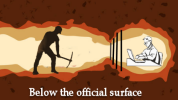 Recent reading of Christine Steenkamp's article about tunnels and conflicts in the Middle East[1] made me think again about open-source, independent media, hacking, viruses, free speech and freedom of information, in a different way. And to connect what is happening with Julian Assange with what is happening in Gaza. Not just in so far as Julian Assange’s Wikileaks, if it were operating with him still in command, would tell us a lot about these wars and might have prevente
Recent reading of Christine Steenkamp's article about tunnels and conflicts in the Middle East[1] made me think again about open-source, independent media, hacking, viruses, free speech and freedom of information, in a different way. And to connect what is happening with Julian Assange with what is happening in Gaza. Not just in so far as Julian Assange’s Wikileaks, if it were operating with him still in command, would tell us a lot about these wars and might have prevente
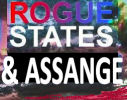 Nils Melzer’s book about the persecution of Julian Assange – Nils Melzer, The Trial of Julian Assange, A story of persecution,[1] must be heeded, due to Melzer’s extraordinary position and status as an independent international investigator and legal expert in complaints of torture and ill-treatment, [2] which has given him access to details and documents not previously available. That is probably why it is hard to get the book in Australia.
Nils Melzer’s book about the persecution of Julian Assange – Nils Melzer, The Trial of Julian Assange, A story of persecution,[1] must be heeded, due to Melzer’s extraordinary position and status as an independent international investigator and legal expert in complaints of torture and ill-treatment, [2] which has given him access to details and documents not previously available. That is probably why it is hard to get the book in Australia. As a result of western crimes against Iraq, a person continues to serve time in prison. "Strangely enough, that person is not any of those who initiated the offensive on Iraq. Instead, he's the man behind exposing American crimes in places like Iraq and Afghanistan and Guantanamo Bay: A whistleblower called Julian Assange." Marzieh Hashemi, journalist and presenter of Secret Files.
As a result of western crimes against Iraq, a person continues to serve time in prison. "Strangely enough, that person is not any of those who initiated the offensive on Iraq. Instead, he's the man behind exposing American crimes in places like Iraq and Afghanistan and Guantanamo Bay: A whistleblower called Julian Assange." Marzieh Hashemi, journalist and presenter of Secret Files.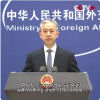 "Assange's case is a mirror which reveals the hypocrisy of the US and British claim to defend press freedom. [Because he revealed their war-crimes ...] the US government has, for more than a decade, filed unwarranted charges of sexual harassment, espionage, and computer-misuse against Assange [...] continuously suppressed Assange through secret surveillance, global pursuit behind the scene, deals, and other means. Britain has spared no effort in cooperating [...]"
"Assange's case is a mirror which reveals the hypocrisy of the US and British claim to defend press freedom. [Because he revealed their war-crimes ...] the US government has, for more than a decade, filed unwarranted charges of sexual harassment, espionage, and computer-misuse against Assange [...] continuously suppressed Assange through secret surveillance, global pursuit behind the scene, deals, and other means. Britain has spared no effort in cooperating [...]" "Official Western institutions have never recognised Assange as a prisoner of conscience,why do you think that is?" Oksana asks Greg Barnes. After almost a decade in confinement, Julian Assange is still fighting against extradition requests to the United States, at cost to his physical and mental health, while also compromising WikiLeaks’ ability to continue its operations.
"Official Western institutions have never recognised Assange as a prisoner of conscience,why do you think that is?" Oksana asks Greg Barnes. After almost a decade in confinement, Julian Assange is still fighting against extradition requests to the United States, at cost to his physical and mental health, while also compromising WikiLeaks’ ability to continue its operations.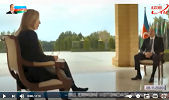 In this video, BBC journalist Orla Guerin interviews Azerbaijan President Aliyev, assuming that Azerbaijan press and politics are heavily censored, and presses him on that. He denies the accusation, then asks her why Julian Assange has been held inhumanely for years, if the British and western press are so free. The BBC journalist simply won't acknowledge the situation for journalists and the media in her own country, kind of proving the president's point.
In this video, BBC journalist Orla Guerin interviews Azerbaijan President Aliyev, assuming that Azerbaijan press and politics are heavily censored, and presses him on that. He denies the accusation, then asks her why Julian Assange has been held inhumanely for years, if the British and western press are so free. The BBC journalist simply won't acknowledge the situation for journalists and the media in her own country, kind of proving the president's point.
 The Parliamentary Joint Committee on Intelligence and Security (PJCIS) is busy finalising its consideration of the
The Parliamentary Joint Committee on Intelligence and Security (PJCIS) is busy finalising its consideration of the  Kristinn Hrafnsson - Editor in Chief of WikiLeaks
Kristinn Hrafnsson - Editor in Chief of WikiLeaks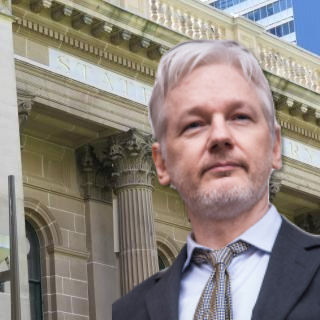
Recent comments